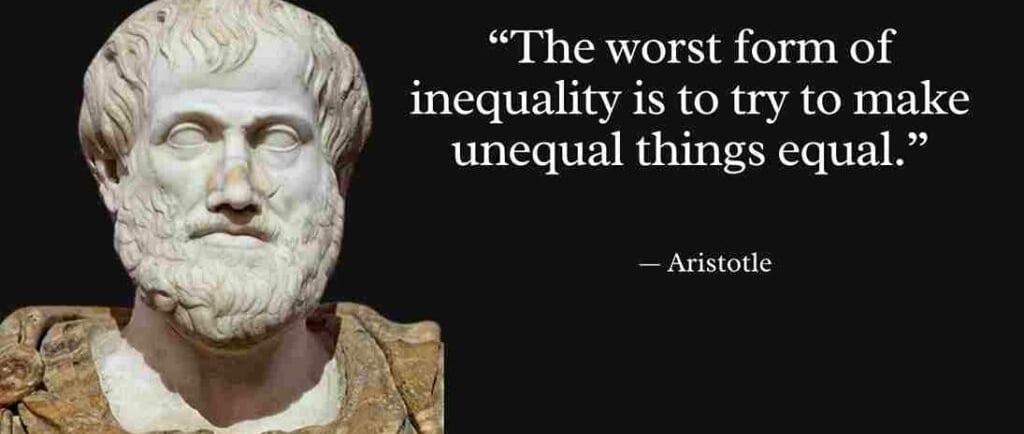Comment in 150 words: Aristotle's Concept on of Equality. (2015) - UPSC PSIR Optional
Aristotle believed equality isn’t about treating everyone the same — it's about giving people what they deserve. For him, justice means proportional equality: rewards and roles should match a person's merit and contribution to the community. 🎯💬
PSIR
8/4/20252 min read


Aristotle’s concept of equality is a foundational idea in political philosophy, where he presents a merit-based, teleological view of justice. For Aristotle, equality doesn’t mean treating everyone the same but treating equals equally and unequals unequally—according to relevant merit and purpose (telos).
⚖️ 1. Proportional vs. Numerical Equality:
Aristotle distinguishes between:
Arithmetic (Numerical) Equality – equal shares regardless of differences (favoured in democracy).
Geometric (Proportional) Equality – based on merit, virtue, and contribution (favoured by Aristotle).
➡️ In Nicomachean Ethics and Politics, he argues that justice must be distributive based on virtue and desert, not simply equality of outcome.
🏛️ 2. Equality in Politics:
Aristotle critiques both oligarchy (based on wealth) and democracy (based on birth or freedom).
He proposes a mixed constitution where political rights are based on education, moral virtue, and contribution to the polis.
True political equality is meaningful only among virtuous and responsible citizens.
💰 3. Economic and Social Equality:
Aristotle justifies natural slavery, arguing that some people are born to rule, and others to serve—based on “natural capacities.”
In today’s terms, this is deeply problematic, but it reflects Aristotle’s emphasis on functional differentiation.
He viewed social harmony as dependent on each fulfilling their natural role, which was a hierarchical but organic view of society.
👥 4. Friendship & Civic Equality:
Philia (civic friendship) is key to Aristotle’s social vision. Citizens, though unequal in virtue, relate to each other as equals within the community.
Equality in this sense is relational, based on shared identity and common pursuit of the good life (eudaimonia).
📌 5. Contemporary Relevance & Critique:
✔️ Influences:
John Rawls mirrors Aristotle's concern for justice but bases it on fairness and hypothetical consent, not virtue or hierarchy.
Michael Sandel and other communitarians borrow from Aristotle’s focus on civic virtue and contextual justice.
❌ Criticisms:
His acceptance of slavery and patriarchy undermines his model from a modern lens.
Feminist scholars like Martha Nussbaum engage with Aristotle through the Capabilities Approach, extending his idea of flourishing to all, irrespective of gender or class.
🧠 Conclusion:
Aristotle’s theory of equality, though hierarchical and exclusionary by today’s standards, provides a rich framework of proportional justice, emphasizing virtue, civic responsibility, and moral education.
It challenges modern democratic thought to balance formal equality with justice-based differentiation, especially in areas like education, public ethics, and meritocracy.
🔁 While modern democracies reject Aristotle’s social exclusions, his core idea—that equality must serve the good life—remains deeply relevant.
Also See